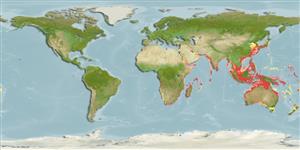Environment: milieu / climate zone / depth range / distribution range
Ecología
marino; salobre demersal; oceanodromo (Ref. 51243); rango de profundidad ? - 100 m (Ref. 9830). Tropical
Indo-West Pacific: East Africa to the Philippines and Japan, south to New Guinea, the Arafura Sea (Ref. 9819), Australia, New Caledonia and Fiji.
Length at first maturity / Tamaño / Peso / Age
Maturity: Lm 93.2 range ? - ? cm
Max length : 200 cm TL macho / no sexado; (Ref. 559); common length : 150 cm TL macho / no sexado; (Ref. 2871); peso máximo publicado: 7.1 kg (Ref. 40637)
Espinas dorsales (total): 0; Espinas anales 0; Vértebra: 128 - 141. Body robust and eel-shaped; snout long; eye diameter 3 times in snout length (Ref. 4832). Head narrower, interorbital width about 10 times in head; lateral-line pores before anus 33-39; dorsal-fin rays before anus 47-49 (Ref. 9830). Posterior nostrils only slightly nearer to eye than to anterior nostrils; mouth very large; teeth generally large and conspicuous (Ref. 4832).
Found in coastal waters, including estuaries; sublittoral above 100 m (Ref. 11230). Feeds on benthic fishes and crustaceans (Ref. 9830). Nocturnal. Known to attack fishers or anglers after being captured (Ref. 6590). Also caught by drift net and bag (dol) nets. Marketed mainly fresh.
van der Elst, R., 1981. A guide to the common sea fishes of southern Africa. C. Struik, Cape Town. 367 p. (Ref. 3670)
IUCN Red List Status (Ref. 130435)
Human uses
Pesquerías: comercial; pesca deportiva: si
Más información
ReferenciasAcuiculturaPerfil de acuiculturaRazasGenéticaElectrophoresesheritabilidadEnfermedadesProcesamientoNutrientsMass conversion
Herramientas
Special reports
Download XML
Fuentes de Internet
Estimates based on models
Preferred temperature (Ref.
123201): 21.7 - 29.1, mean 28 °C (based on 2108 cells).
Phylogenetic diversity index (Ref.
82804): PD
50 = 0.6250 [Uniqueness, from 0.5 = low to 2.0 = high].
Bayesian length-weight: a=0.00182 (0.00101 - 0.00327), b=2.91 (2.74 - 3.08), in cm total length, based on LWR estimates for this species & (Sub)family-body (Ref.
93245).
Nivel trófico (Ref.
69278): 4.0 ±0.67 se; based on food items.
Generation time: 6.1 ( na - na) years. Estimated as median ln(3)/K based on 1
growth studies.
Resiliencia (Ref.
120179): Alto, población duplicada en un tiempo mínimo inferior a 15 meses (Fec=17,475).
Fishing Vulnerability (Ref.
59153): High vulnerability (62 of 100).
